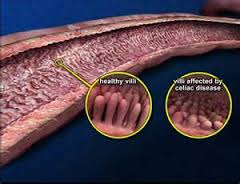What is Celiac Disease?
Celiac disease is an
autoimmune disorder that can occur in genetically predisposed people
where the ingestion of gluten leads to damage in the small intestine.
It is estimated to affect 1 in 100 people worldwide. Two and one-half
million Americans are undiagnosed and are at risk for long-term health
complications.
image: https://celiac.org/wp-content/uploads/2013/04/damanged-villi.png When people with celiac disease eat gluten (a protein found in wheat,
rye and barley), their body mounts an immune response that attacks the
small intestine. These attacks lead to damage on the villi, small
fingerlike projections that line the small intestine, that promote
nutrient absorption. When the villi get damaged, nutrients cannot be
absorbed properly into the body.
When people with celiac disease eat gluten (a protein found in wheat,
rye and barley), their body mounts an immune response that attacks the
small intestine. These attacks lead to damage on the villi, small
fingerlike projections that line the small intestine, that promote
nutrient absorption. When the villi get damaged, nutrients cannot be
absorbed properly into the body.Celiac disease is hereditary, meaning that it runs in families. People with a first-degree relative with celiac disease (parent, child, sibling) have a 1 in 10 risk of developing celiac disease.
THREE THINGS YOU CAN DO RIGHT NOW!
1. Think You Have Celiac Disease? Complete the Symptoms Checklist.image: https://celiac.org/wp-content/uploads/2013/04/checklist.png
 2. Stay Informed. Join our Mailing List!
2. Stay Informed. Join our Mailing List!image: https://celiac.org/wp-content/uploads/2013/04/mail.png
image: https://celiac.org/wp-content/uploads/2013/04/RiAAg6riL.png
Long Term Health Effects
Celiac disease can develop at any age after people start eating foods or medicines that contain gluten. Left untreated, celiac disease can lead to additional serious health problems. These include the development of other autoimmune disorders like Type I diabetes and multiple sclerosis (MS), dermatitis herpetiformis (an itchy skin rash), anemia, osteoporosis, infertility and miscarriage, neurological conditions like epilepsy and migraines, short stature, and intestinal cancers.Treatment
Currently, the only treatment for celiac disease is lifelong adherence to a strict gluten-free diet. People living gluten-free must avoid foods with wheat, rye and barley, such as bread and beer. Ingesting small amounts of gluten, like crumbs from a cutting board or toaster, can trigger small intestine damage.Read about the Gluten-Free Diet.
Celiac disease is also known as coeliac disease, celiac sprue, non-tropical sprue, and gluten sensitive enteropathy.
Undiagnosed or untreated celiac disease can lead to:
Long-Term Health Conditions
- Iron deficiency anemia
- Early onset osteoporosis or osteopenia
- Infertility and miscarriage
- Lactose intolerance
- Vitamin and mineral deficiencies
- Central and peripheral nervous system disorders
- Pancreatic insufficiency
- Intestinal lymphomas and other GI cancers (malignancies)
- Gall bladder malfunction
- Neurological manifestations, including ataxia, epileptic seizures, dementia, migraine, neuropathy, myopathy and multifocal leucoencephalopathy
Other Autoimmune Disorders
In a 1999 study, Ventura, et al. found that for people with celiac disease, the later the age of diagnosis, the greater the chance of developing another autoimmune disorder.Read more at https://celiac.org/celiac-disease/what-is-celiac-disease/#xvLOpm9JHhARiXoC.99
No comments:
Post a Comment